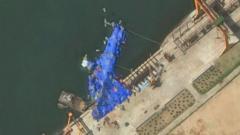North Korea apprehends several officials, including a senior party member, after a failed warship launch that embarrassed the regime and sparked harsh criticism from Kim Jong Un, signaling a determination to bolster military capabilities.
North Korea's Leadership Shake-Up Following Warship Launch Failure

North Korea's Leadership Shake-Up Following Warship Launch Failure
Kim Jong Un holds officials accountable as regime grapples with military setbacks.
North Korea has taken significant action against its military leadership following the disastrous launch of a new warship that has drawn the ire of Kim Jong Un. The regime arrested Ri Hyong-son, the deputy director of the ruling Workers' Party's Munitions Industry Department, citing he is "largely responsible for the serious accident" that transpired the previous week, as reported by the state-run news agency KCNA on Monday.
The incident involved a 5,000-ton destroyer that tipped over, resulting in hull damage and prompting Kim to label it a "criminal act" detrimental to the nation's "dignity and pride." Currently, repairs are underway, guided by a team of experts, according to KCNA.
Ri is the most senior official arrested in connection with the incident thus far. He is a member of the Central Military Commission, the body that oversees the Korean People's Army and is tasked with developing North Korean military policy. Over the weekend, authorities also detained three other officials connected to the Chongjin shipyard, where the vessel was constructed—these included the chief engineer and the site's construction and administrative heads.
In previous remarks, Kim attributed the launch's failure to "absolute carelessness, irresponsibility, and unscientific empiricism." While it remains unclear what penalties the detained officials may face, North Korea has a history of meting out harsh punishments, including forced labor and execution, for failures deemed unacceptable.
Public acknowledgment of such incidents is infrequent in North Korea. However, it occasionally occurs, particularly after failed satellite launches. Analysts note that Kim's swift and severe response could serve as an indicator of Pyongyang's intent to continue enhancing its military prowess.
Chun In-bum, a former commander of South Korea's special forces, remarked that while criticism is regular in totalitarian regimes, the transparency exhibited by state media in this instance is unusual. He expressed concerns that this indicates a growing confidence and resilience within the Kim regime, stating that North Korea seems poised to actively challenge South Korea's sovereignty.
Michael Madden, a North Korean military expert from the Stimson Center in Washington, characterized Kim's reaction as reflective of the "high priority" the regime is placing on naval development. He suggested that the mishap could have been a result of excessive internal pressure placed on personnel and production teams to hastily meet project deadlines.
The recent shipyard accident follows the unveiling of a comparable warship in a different locality just weeks prior, which Kim had celebrated as a "breakthrough" in the modernization of North Korea's naval forces with plans for deployment early next year.



















